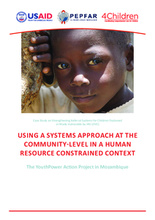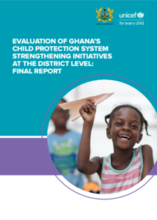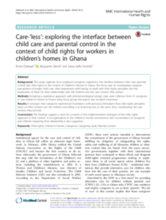Displaying 281 - 290 of 505
This case study is one in a series of case studies highlighting different aspects of a case management system and referral mechanisms utilized by OVC programs. The case study presents a program in Mozambique that could be identified as a hub and spoke model of referral mechanism.
This study examined communication between 51 transition-aged foster youth and their social workers as related to perceived relationship quality and satisfaction with care receipt/provision.
Through qualitative interviews with local child protection workers, this paper indicates that traditional values assist legislative intervention and that significant potential exists in better integration of Indigenous approaches into practice.
This quantitative study contributes knowledge regarding the attitude of professionals towards positive parenting and child participation.
This study examined the associations between exposure to armed conflict, perceived support, work experience, needing help, and post-traumatic distress among Israeli social workers in foster care agencies based on Conservation of Resources theory.
The objective of this evaluation is to document and assess how the capacity of the child protection system in Ghana—in particular the practices of the Social Welfare Actors (SWA)—has changed to enable the provision of quality services to children and families with support of the workforce strengthening (WFS) initiative.
The current study presents findings from a survey of child welfare caseworkers' experiences with reunifications and focuses on practices and key factors at the casework practice and at the system-environment level to assist in achieving successful reunification.
In this sample of 160 retained specially-trained public child welfare workers and former students, sources of stress and satisfaction were examined three and five years after the conclusion of the students’ work obligation.
This study explored how employed caregivers experience the interface between child care, parental control and child rights in the context of Children’s Homes in Ghana.
This paper analyzes the perspectives of eleven social workers doing child protection work and examines the accounts of thirteen parents living with mental illness or addiction who have been involved in child custody investigations in Aotearoa New Zealand.



